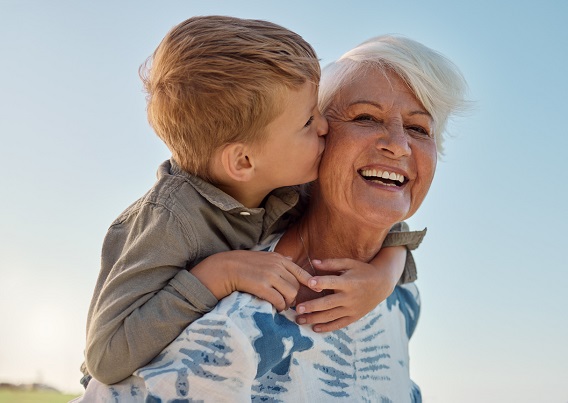Talking to Children About Mesothelioma
Awareness & ResearchWritten by Dana Nolan, MS, LMHC | Edited By Walter Pacheco

As a mental health counselor working in cancer care, I have helped many cancer patients figure out how to tackle difficult conversations. One of the most challenging conversations: How do I tell my children or grandchildren about our family member’s cancer diagnosis?
Many older mesothelioma patients may be close to their grandchildren or are helping raise them. Some people diagnosed with mesothelioma at a younger age may be living with minors. Regardless of patient age, many want to know how to best support and educate their children or grandchildren about cancer.
Over the past several decades, researchers have studied how a cancer diagnosis in the family affects children. They have developed recommendations and suggestions that parents and grandparents who are coping with cancer can discuss with children.
Don’t Keep Children in the Dark
Most of us are quite protective of our children, whether they’re grandchildren, nieces or nephews. We feel it’s our job to protect them from distress or harm and may decide that not telling them the scary truth is the best option to protect their feelings.
But all the research on the topic of supporting children when a family member has cancer confirms it’s detrimental to keep information such as a parent or grandparent having cancer away from children.
Children often correctly sense when something is wrong in their families. They may overhear conversations between adults or notice a change in their routines at home. Withholding important mesothelioma diagnosis information that affects the entire family leads to confusion, uncertainty and erodes trust.
They worry more when they sense important information is kept from them and will fill in what they don’t know with the worst-case scenario.
The ideal time to talk to children about cancer in the family is when a treatment plan is in place but hasn’t yet started. Children may already have noticed a parent or grandparent appears sick. They may have seen them frequently visiting the doctor. It’s okay to tell the children a parent or grandparent isn’t feeling well, but they’re going to the doctor to see what’s wrong.
Reassure children that they will be informed if something serious is happening that will affect them or their loved one. They will value this reassurance and maintain their trust.
Prepare, Inform Children About Mesothelioma
Fifty years ago, we rarely uttered the word “cancer.” It was whispered or called “The Big C.” Today, we speak about cancer more comfortably although with some trepidation.
However, we shouldn’t shy away from speaking with children about cancer. As mentioned earlier, research shows children will do better when they are prepared for what they might see and feel as far as changes in their lives.
A good start is describing where the mesothelioma is located in the body and type of treatment the parent or grandparent will undergo. With younger children, keep the language simple but honest. Let them know the general area where mesothelioma is located such as the lungs, abdomen or heart.
Think about the signs of mesothelioma, such as hair loss, weight loss, moving more slowly, eating differently, sleeping more and other symptoms, that the child or grandchild may see. You should explain that those are symptoms related to mesothelioma or the effect of the medicine that’s helping the loved one feel better.
Reassure the child they can’t catch mesothelioma from you or their grandparent and that someone will always take care of them if you are feeling sick or need to be in the hospital. Acknowledge that the illness is disappointing and frustrating and that you wish it wasn’t affecting everyone’s life. Tell children that it’s okay to feel sad, scared, and even angry at the mesothelioma for coming into your lives.
Older children and teens may want to know more details about your mesothelioma and treatment. You can answer their questions as honestly as you wish. Older children and teens may seek support and talk about your mesothelioma and their feelings with their friends, which is developmentally appropriate.
Don’t overwhelm them with too much information about your cancer and treatment. Instead, you can offer to answer your child’s questions as they arise. Normalize your feelings and theirs and offer to connect them with a peer support group or a counselor if they want someone to talk to besides family or friends.
How to Handle Conversations About Death
A question you may dread hearing from your child or grandchild: “Are you going to die?” Many parents and grandparents diagnosed with mesothelioma have struggled with how to answer this question.
The best answer is an honest one. Do not tell a child you are sure you’re going to beat the cancer and won’t leave them. Instead, you can consider these honest responses:
- “We are all going to die someday, but I hope it is not soon. If the doctors think that I am not going to live much longer, then I will talk with you about that.”
- “The doctors are trying hard to stop my mesothelioma from growing and right now it is working. I promise I will tell you if that changes.”
- “What scares you about me dying? Are you worried about who will take care of you? What worries you most?”
These answers not only address the child’s concerns, but they also allow a parent or grandparent to engage the child and reassure them that you are listening to them. Here are some additional resources to help you discuss cancer with younger family members.
- American Cancer Society: Telling a Child Someone They Love Has Cancer
- National Cancer Institute: Talking to Children About Your Cancer
Parents are responsible for talking to children about cancer in the family. Ideally, children should be informed in an age-appropriate way about your mesothelioma. Hopefully these tips will help you overcome any fears or questions you may have about talking to children about mesothelioma.






